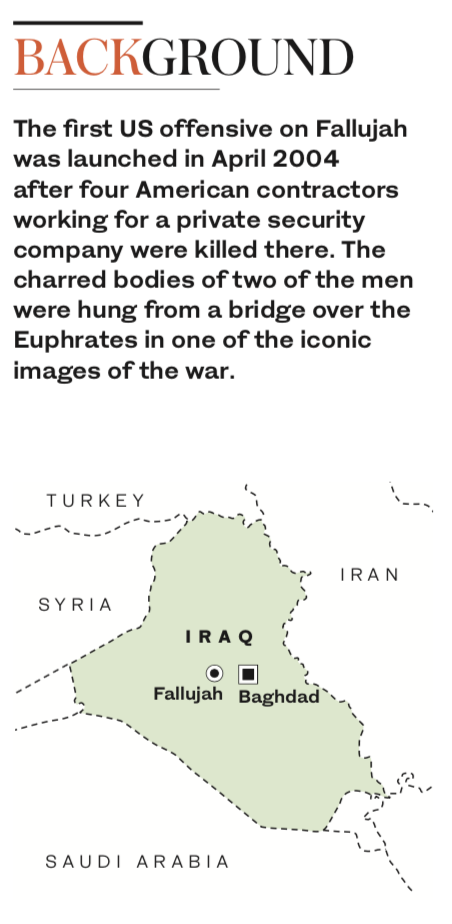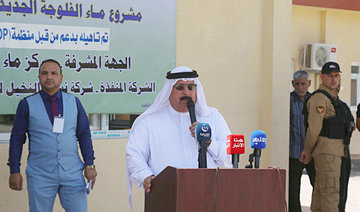FALLUJAH, Iraq: The main road running through the heart of Fallujah cuts the landscape in two like a fissure from an earthquake. On either side several of the buildings are gouged open by mortar shells and pockmarked with bullet holes. Even the general hospital, which once served as the local headquarters of Daesh, lies in ruins.
For the Iraqi commandos who must patrol this city, the long strip of tarmac — with its central reservation of dirt and shrubs — is still the safest way into town. The troops have been making significant progress in gaining the trust of people here, but they must move slowly and carefully. One wrong turn or misplaced word could undo all their hard work.
“People are tired. Their losses were great and the sacrifices we have made to regain the city are irreplaceable,” Capt. Haider Jabar, commander of the Commando Battalion, 50th Brigade, 14th Infantry Division, told Arab News as he moved through the rubble. “I hope this calm and security will continue and that we will not have to fight again.”
Fallujah lies around 66 kilometers west of Baghdad but shares little in common with the bustling, cosmopolitan capital. The population is deeply conservative and dominated by Sunni Arabs. An inescapable sense of tension and sadness lingers in the air.
Everyone, including the commandos and the local women who watch them warily, carries the burden of the city’s past. But Jabar and his troops know that if they can overcome this ill-feeling and succeed in their mission to keep the peace here, the entire nation will benefit.
Fallujah’s strategic location in Al-Anbar province — the heartland of Iraq’s Sunni tribes — and its reputation as a symbol of resistance for people across the Muslim world, mean its stability is essential to the country’s chances of recovering from the past 15 years of war.
Since the 2003 US-led invasion of Iraq, the city has been hit by a succession of conflicts that have devastated its infrastructure and left its residents mentally and physically scarred.
Once known as the “City of Mosques” and home to about 300,000 people, Fallujah has become synonymous with violence and radicalism. At different times American forces, Al-Qaeda and Daesh have all brought chaos to the vast neighborhoods of warren-like alleyways, trash-filled slums and cinder-block houses.
 In 2004, US troops waged two battles in the city against Iraqi and foreign extremists, and residents driven to take up arms by the occupation. The ferocious combat killed more than 100 American military personnel and thousands of insurgents. Tens of thousands of civilians were displaced.
In 2004, US troops waged two battles in the city against Iraqi and foreign extremists, and residents driven to take up arms by the occupation. The ferocious combat killed more than 100 American military personnel and thousands of insurgents. Tens of thousands of civilians were displaced.
A decade of simmering violence followed until Daesh began to seize control of the city in late December 2013 with help from local tribes, riding into Fallujah on a groundswell of anger at the corruption and discrimination prevalent in Baghdad’s Shiite-dominated government. It was the first time the radical group had seized a major urban center anywhere in Iraq.
Daesh ruled Fallujah under a draconian interpretation of Islamic law for two-and-a-half years. Men were imprisoned for minor violations such as smoking, women were forbidden from going out alone in public and alleged spies were beheaded in the main market. Young males were made to fight alongside the extremists.
Then in June 2016 the Iraqi military retook control of the city after a month-long offensive. It has been struggling to keep the peace ever since, with traces of black graffiti from Daesh still defacing property once occupied by the group. In response, the troops have left their own mark. “The commandos of Baghdad were here,” read one message scrawled in green on the wall of a house.
When Arab News joined Jabar on a routine patrol this spring, there were also more tangible signs that he and his men may be succeeding where the various armed groups that walked these streets before them failed. The situation, however, was balanced on a knife edge.
“We used to hate (the Iraqi army) — I say this openly,” said Abdulqadir Mohammed, a local resident. “They were annoying and deliberately humiliated us when we passed through the security checkpoints. They used to spread sectarian slogans and do everything they could to provoke the people of the city.
“Now their performance is more than excellent. They treat everyone with respect and without discrimination.”
The first stop on the commandos’ patrol was Na’imiya, a suburb of southern Fallujah that served as the frontline in the fight between Daesh and the Iraqi army. With the Euphrates river snaking past to the west, the houses, dirt roads and empty yards were still laced with land mines and makeshift bombs planted by the retreating militants.
Jabar got down from his armored pick-up truck and tried to remain calm as he advanced on foot through the neighborhood. It was sunny, around 22 degrees Celsius, and while his troops were armed with Kalashnikovs, he did not openly carry a weapon. Only occasionally did the tension get the better of him.
“Stay back, walk exactly where I’m walking — this area is still mined,” he shouted at his men at one point.
Passing from house to house, he spoke to several families whose relatives had been killed or injured. Many of the people looked exhausted and distressed, as if they might never piece their lives back together.
“The smell of the militants’ rotting corpses and the gunpowder still fills my nose,” Jabar told Arab News, as he recalled the offensive against Daesh.
“Our losses were great but it was militarily acceptable compared to the ferocity and nature of the battle. It was not a direct fight. The militants were relying on snipers, suicide bombers, improvised explosive devices and the booby traps which you can see everywhere around you. They were freely moving from house to house through openings they had made in the walls.”
From Na’imiya the commandos moved on to Al-Andalus, a slum neighborhood largely untouched by the destruction elsewhere in the city. They then headed to Al-Shuhada, their pick-up trucks bumping up and down as they drove along roads damaged by Daesh explosive devices.
Huddled into the rear of the trucks, they could see signs of life getting back to normal, with teenagers playing football amid the crumbling houses. But the sheer scale of the destruction became impossible to ignore the deeper the troops moved into Al-Shuhada.
Makeshift bombs were still lying untouched inside empty yards, the dust and dirt that once covered them washed away by recent rain. Everywhere, buildings lay in ruins.
As Jabar left his truck and went to inspect one partially damaged house, a man frantically yelled at him from several hundred yards away, warning him to stay clear of the property because it was booby trapped. Jabar told his troops to remain close but his customary calm was again fraying at the edges.
In the distance some of the commandos pointed out a government housing complex that they ominously referred to as “Al-Hayakil,” meaning “The Structures” in Arabic.
They recalled how the buildings there had been used as firing positions by Daesh snipers looking to pick off Iraqi forces advancing toward Fallujah from Baghdad. “Our troops were under their eyes,” said one.
Soon afterwards, Jabar decided that he had seen enough and issued the order to move on. The fight to free Fallujah from the extremists had taken its toll on him and he did not want to lose anymore men. Aged 34, he had experienced the breakdown of his first marriage as a direct result of his work in the city.
His wife, he told Arab News, had been unable to cope with his long absences from home while he was deployed to Fallujah. They had separated but he had since married again and was cautiously optimistic that both he and the city were beginning to leave the misery of the past behind.
For the civilians who have suffered in the succession of conflicts to hit Fallujah, however, moving on is not so easy.
The commandos ended their patrol at the house of Abu Saif, a quiet, bespectacled 50-year-old who works as a taxi driver. Earlier that day people had told them that two of his four sons, Wissam and Hamoudi, had recently been killed by one of the explosive devices hidden in Al-Shuhada.
Jabar had spoken to him briefly at a local police station, but Abu Saif had been angry then and blamed the Iraqi army’s “negligence and corruption” for the deaths. Now, with evening drawing in, Jabar wanted to talk to him again.
Inside the house the tension between them gradually eased as they sat around a small oil heater, smoking cigarettes and drinking endless cups of tea.
Abu Saif complained that the man he suspected of killing his sons was walking freely around Fallujah because the police refused to arrest him.
“You have to talk to the judge,” Jabar replied, as he took a deep breath on his cigarette. “This is my mobile number. If the judge does not do anything, just ring me. I will personally interfere and put (the corrupt police) officers in jail.”
Outside, some of the commandos smoked a shisha pipe with a local resident while their colleagues dozed in the evening sun. Another of the soldiers played with a child.
Jabar finally left the house after almost two hours. He roused his men and they began the slow journey back to base.




















